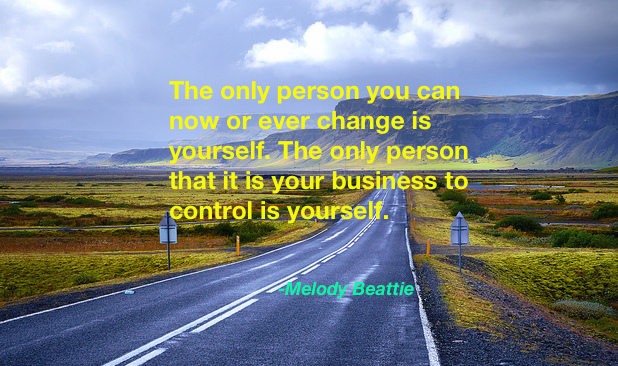 Original Photo Credit: Moyan Brenn
Original Photo Credit: Moyan Brenn Low Self-Esteem:
At the center of co-dependency lies low self-esteem and low self-worth or, in different words, negative beliefs about my lovability and my contributions in this world. Because the term co-dependency is used so frequently these days, some critics say it is a catch word that really doesn’t describe anything at all or that, because most of us fall into this category, is null and void.
Few Escape Co-Dependency:
The way I see it and my experience has shown it, the sad truth is that most of us do fall into this category. Indeed, in the addiction field we now say that co-dependency is at the core of all addictions. In addition to the addicts and alcoholics, there are all the ones who live with them and try to control their behavior; and then there are all the offspring who grow up in that kind of environment and then form families of their own. I have met few people who did not suffer from some degree of low self-esteem and low self-worth.
The Causes of Low Self-Esteem:
Low self-esteem or the belief that I’m not lovable grows out of emotional or physical neglect. The parents are too preoccupied with their own drama and emotions to have any energy left over for the child, or they simply don’t know how to properly love and care for a child because they never experienced it themselves.
Low self-worth or the belief that I do not have valuable contributions to make grows out of actual abuse. If, as a child, I am given the message — even non-verbally — that I am stupid, I will believe it because an adult is telling me so. If I am beaten, there must be something bad about me. If I am sexually molested, the boundaries to my innermost self must not matter much. If I am forced to believe in a certain form of God with rigid rules for all adherents, I must be incapable of finding my own sense of mystery and I don’t get taught moral standards that connect me to the rest of humanity.
The Resulting Coping Mechanisms for Low Self-Esteem:
Out of these beliefs of not being lovable and not having anything of importance to contribute we develop all kinds of behaviors in an effort to secure what we unconsciously know we need for survival: attention!
If I deem myself not lovable, I’ll do anything to make myself so. I will be a really good girl or good boy and try to please the parents; I will rise above my actual age and emotionally carry the parents when I sense that they are incapable of doing so themselves. I will forego my own needs in order to not be burdensome. I will become a little joker in order to bring some lightness into the family. I will disappear into my own world so my parent, who already has so much to worry about, doesn’t have to worry about me.
If I doubt my ability to make valuable contributions, I will do one of two things: I will either work extra hard in order to achieve in this world or I will rebel and sow destruction. If I work extra hard I might do so at the expense of connecting with others in a meaningful way or of my physical health. And usually, no matter how hard I work or how much I accomplish, I am left with a sense that I have not done enough. If I rebel and choose destructive behaviors, they might be harmful to others (i.e. stealing), but in addition to that, they are always harmful to me. By destroying myself, I prove the parent right.
Co-Dependency is Not a Diagnosis:
Co-Dependency describes an interpersonal and inner-personal dynamic. It is not a diagnosis. The mental or emotional conditions that we carry away when growing up co-dependent may be diagnosable. We may suffer from anxiety, depression or post-traumatic stress disorder. We may be obsessive-compulsive or be labeled ADD. Or we might choose from a huge variety of addictions in order not to feel what is going on in our core.
Healing from Co-Dependency is Possible:
Luckily, at this time in history and in this part of the world we have many avenues available to help us heal and grow. We have abundant literature and 12-Step fellowships. We have spiritual communities that encompass all of humanity, and we have rich learning opportunities at workshops that foster our human potential and in schools that can meet our intellectual needs. And we have group and individual therapies.
If you are interested in exploring therapy to deal with your co-dependency or with the resulting consequences, such as anxiety, depression or PTSD, feel free to give me a call.
 About this Contributor: Gudrun Zomerland, MFT is a licensed marriage and family therapist with offices in Santa Rosa and Petaluma, CA. She writes: “I grew up in post-war Germany and moved to the US in my mid-twenties. The exposure to two cultures has given me an appreciation for diversity, its riches and challenges. Because I was affected by the immense destructiveness of war just prior to my birth, I have a particular sensitivity to personal as well as historical trauma and the deep fear, pain, rage and/or guilt some of us carry inside. I find personal self-exploration, interpersonal discovery, artistic expression, a spiritual belief, and humor of utmost importance in people’s achievement of mental health. I see inner well-being as a life-long task.” For more information about Gudrun’s work or to contact her, please visit: http://www.chinnstreetcounseling.com/zomerland/index.shtml
About this Contributor: Gudrun Zomerland, MFT is a licensed marriage and family therapist with offices in Santa Rosa and Petaluma, CA. She writes: “I grew up in post-war Germany and moved to the US in my mid-twenties. The exposure to two cultures has given me an appreciation for diversity, its riches and challenges. Because I was affected by the immense destructiveness of war just prior to my birth, I have a particular sensitivity to personal as well as historical trauma and the deep fear, pain, rage and/or guilt some of us carry inside. I find personal self-exploration, interpersonal discovery, artistic expression, a spiritual belief, and humor of utmost importance in people’s achievement of mental health. I see inner well-being as a life-long task.” For more information about Gudrun’s work or to contact her, please visit: http://www.chinnstreetcounseling.com/zomerland/index.shtml
Leave a reply
You must be logged in to post a comment.

Clark Rector, M.A. said on June 13, 2015
Interesting. This concept is very popular at my current practicum, but is rarely mentioned at my school. Is there a difference between enabling and co-dependency?
And another thing, to what degree might co-dependency be an extension of the popular value of independence especially prevalent in the US?
Clark Rector, M.A. said on June 13, 2015
I mean, is codependency, in part, seen as a problem due to the high value of independence in US culture?